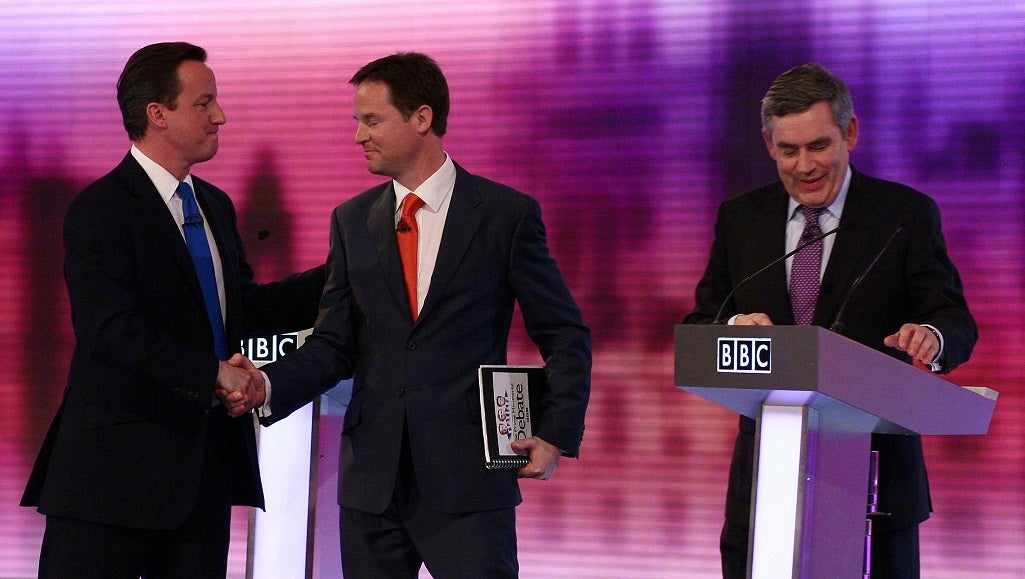No excuses, our leaders should debate on TV in 2015
There are signs that the Tories want to opt out - they shouldn't be alllowed to

With the final US presidential debate just passed, attention has turned to our own leaders’ encounters and the possibility of them being televised once more in the run-up to the 2015 general election. After the novelty and intrigue of the three we were treated to in 2010, one might think that TV debates had become part of the British political furniture. Were it so simple.
The first signs of grumbling and discontent have emerged, primarily from the Conservatives. Many grassroots supporters take the view that the 2010 debates harmed David Cameron and denied his party a parliamentary majority. Because the odds on him securing a majority this time round look slim (to say the least), why risk further damage?
For now, this appears to be the main stumbling block. But added to it comes questions about the number of debates that should take place, and their format.
For anyone who dragged themselves out of bed at 2am on a work night to watch all three presidential debates (guilty!), the idea that the UK may now bin them doesn’t go down too well.
Whatever the reservations and logistical complexities, the public are entitled to see the people who would be running the country discuss how they would do so – in the most accessible format. In fact, I’d go further and argue that the leaders and the parties should no longer have any say. TV debates should be guaranteed in every general election.
Pressure from the media, on all sides of the divide, would be a useful first step in making this happen.
Much of the criticism points to the fact that TV debates risk presidentialising our system. But it’s a bit late for that. Our system is presidential already, whether we like it or not. What else towers over the party conference season if not the leader’s speech?
And what about Prime Minister’s Questions? There it’s the sparring between the PM and his opposite number, not backbench contributions, that most often makes the headlines.
Cult of the leader
The figure of the party leader is more important than ever before. It’s because Ed Miliband’s approval ratings fail to match his party’s that Labour still have so much work to do.
And David Cameron almost single-handedly rebranded his party, however superficially, giving them the opportunity to govern once again.
Ed Miliband’s team seem confident he’ll relish a TV debate. There has long been the view that Miliband thrives in the town-hall style format, enjoying audience interaction. One school of thought has it that his impressive hustings performance before becoming Labour leader played a major role in his victory.
The Lib Dems have a different dilemma. In 2010, Nick Clegg blossomed on television - but his commanding and polished debating skills failed to translate into extra seats in the Commons.
After everything, the Lib Dems had fewer MPs than before. If he’s still party leader by 2015 Clegg might well relish the chance for some very public rehabilitation. But if he’s gone, Vince Cable or Tim Farron would crave the chance to put distance between themselves and the Conservatives - this could be their party’s best hope of avoiding an electoral meltdown.
The electorate are more volatile than ever before. As UKIP are flirting with third place in the polls, Nigel Farage might well demand that he share a platform with the other party leaders.
Yes, there are issues to be settled, with the format top of the agenda. The 2010 debates were formulaic and sterile, with audience members asking general and unimaginative questions, without the opportunity to respond to answers. This needs to be changed, as does plonking the leaders rigidly behind lecterns. A town-hall style format, where those debating can roam more freely, would inject a bit of razzmatazz into proceedings.
What we mustn’t allow to happen is for the public to be fobbed off with self-interested excuses as to why we won’t be getting TV debates before the next election. Anything which grabs our attention and provides discussion about politics can only be a good thing. Given the apathy (or worse) that currently stalks our political landscape, our leaders can’t afford to be picky.
Join our commenting forum
Join thought-provoking conversations, follow other Independent readers and see their replies
Comments
Bookmark popover
Removed from bookmarks